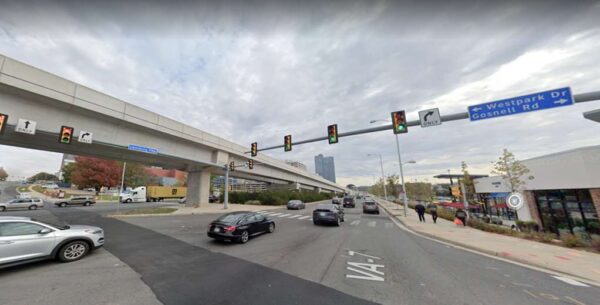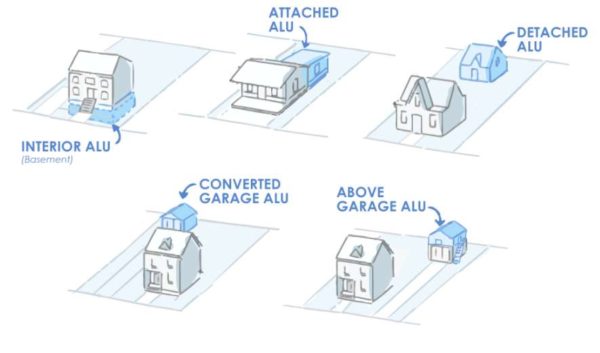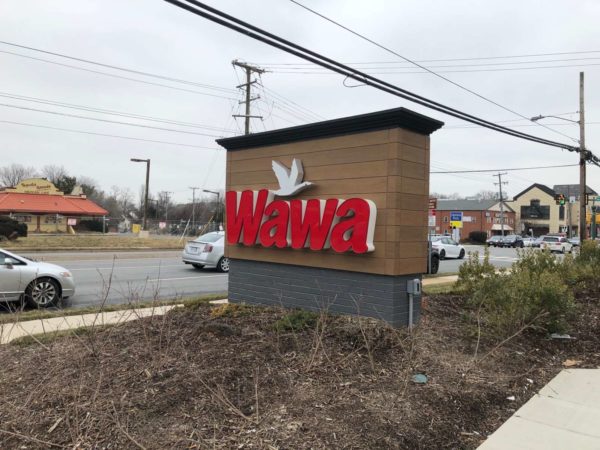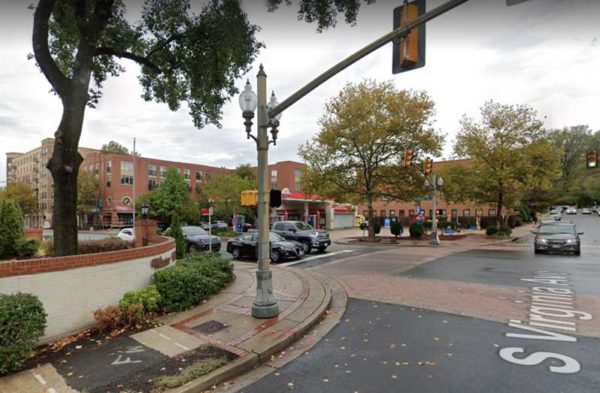Getting to and from Metro stations can be a harrowing experience for pedestrians and cyclists, and the Fairfax County Planning Commission and others want something to be done about it.
The planning commissioners have called on the Fairfax County Board of Supervisors to require Metro, the state and county transportation departments, and more to “work immediately” to make safety and accessibility improvements for pedestrians and bicyclists to transit stations.
“This is a call for action by the public to improve pedestrian/bicycle access to metro stations as envisioned in the comprehensive plan,” Hunter Mill District Planning Commissioner John Carter said when introducing a motion during the commission’s meeting on May 19.
The measure calls for numerous changes, such as:
- Providing wide sidewalks at intersections within walking distance of transit stations,
- Making turns on roads tighter at intersections to slow traffic down,
- Providing a “double ramp” for people with disabilities instead of single ramp that’s currently in use directing pedestrians to the middle of intersections,
- Avoiding extra turning lanes at intersections with high volumes of pedestrians
- Providing closely spaced street trees between curb and sidewalk areas to protect pedestrians.
The motion passed, with 10 members voting for it and at-large member Timothy Sargeant, abstaining. Sargeant did not respond to a message seeking comment on why he voted that way.
“Failure to act will cause pedestrian access to continue to be ‘significantly challenged’ and ridership on the metro station to be reduced,” Carter said.
He introduced the motion during the commission’s discussion on whether to approve changes to the mixed-use Reston Gateway development being constructed near the upcoming Reston Town Center Metro station, but he noted that the issues seen there could apply to other locations as well.
Supervisor Walter Alcorn, whose Hunter Mill District includes the Reston Gateway project, agrees that the main crosswalk serving the Reston Town Center station is not pedestrian-friendly.
“The rail project used cookie-cutter designs,” he said, adding that a walkway over the road has been proposed but could be years away from coming to fruition.
When touring the area a couple weeks ago, Alcorn asked the Fairfax County Department of Transportation to identify short-term improvements to occur before the station opens, which isn’t expected to happen until early 2022.
“I want to make sure riders can readily get to the stations on day one and every day thereafter,” he said.
Pedestrian and bicyclist advocacy groups expressed support for the commission’s call for change.
Fairfax Alliance for Better Bicycling President Bruce Wright says some progress has been made to improve safety, but numerous deficiencies remain. The Greensboro station in Tysons, for example, not only lacks access from Gosnell Road and Westpark Drive, the roads are outright dangerous, he says.
The Fairfax County Planning Commission deferred a decision on the McLean Community Business Center comprehensive plan until June during a meeting last Wednesday (May 26).
It was the second deferral for the plan to guide development in downtown McLean, which has been developing over the last three years. The hotly debated plan was originally slated to go before the commission for a public hearing in April but was deferred to May. During that time, further revisions were made to the final draft.
Now, the planning commission will make a decision on June 9 ahead of a Board of Supervisors meeting set for June 22.
“A lot of hard work has been put into this,” Dranesville District Commissioner John Ulfelder said. “I think those revisions help with some of the issues that have arisen since the original staff report. But we’re going to hear from the community there are still differences of opinion about the proposed language.”
Nearly two dozen speakers voiced their opinions at the commission’s public hearing last week, and a majority had criticisms of certain aspects of the plan or the plan in its entirety. Among the demands were more stringent stormwater protections, more surface parking, and a lower cap on residential units.
Covering a 230-acre area between Dolley Madison Boulevard, Chain Bridge Road, and Old Dominion Road, the draft plan is meant to incentivize developers to come to McLean and build more residential density in exchange for public open space and other community amenities. The plan also no longer prescribes specific uses for specific properties.
The plan divides the downtown area into Center, General, and Edge zones, each with height requirements. It allows for up to 3,850 residential units in McLean, which currently has 1,280 units.
Robert Jackson, president of the McLean Citizens Association, said the organization opposes the newest draft plan on the grounds of parking and stormwater management.
“Some changes made, and we are pleased with some of them, but [those] two major issues remain unaddressed satisfactorily,” he said.
The MCA previously recommended removing the entire parking management section because “its intention is to make parking scarce, not plentiful,” he said. It also recommended restoring old language with more specific and protective stormwater requirements.
Barbara Ryan, a citizen and credentialed sustainable landscape designer, said each subsequent draft has diluted stormwater management requirements. She called for restoring a requirement that new development retains one inch of water and imposing a volume limit on runoff, rather than requiring a reduction.
“The focus needs to address flooding and streambed erosion concerns, particularly as we are seeing downstream erosion in Pimmit Run,” she said.
Responding to earlier input, county staff recently added a provision stating that the plan will be reviewed either in 2031 or when 1,660 units are built or in development, whichever comes first. That would result in 2,360 total units in McLean, which is a few hundred more than the current upper limit of 2,175.
But planning commissioners were skeptical of the 10-year timeframe.
“One of the issues in development years is that 10 years is in the blink of an eye,” Ulfelder said. “I think this is necessary and appropriate, but it’s not clear to me what we’ll know in this timeframe unless the developers are hanging outside the CBC waiting for this plan amendment to be passed — salivating, waiting to put together some blocks of land, particularly in the center zone.” Read More
A planned overhaul of The Madeira School won the uncontested endorsement of the McLean Citizens Association last week as it moves towards the Fairfax County Planning Commission for review.
The Madeira School is an all-girl’s private school at 8328 Georgetown Pike in McLean founded in 1906. While not looking to expand its student population, the school is hoping to expand and renovate some of the outdated buildings.
The centerpiece of the proposal is the removal of the site’s existing science building so it can be replaced with a new structure with upgraded classrooms. Other additions include a stables building, a new residential hall, and new faculty housing.
In an article on the school’s website, school administrators say the new classrooms will replace outdated 1970s facilities that don’t meet the school’s needs and are difficult to maintain.
“Replacing Madeira’s current science facility is a critical need — and not only because our curriculum has outgrown it,” the school said. “We are limited by our current building, constructed in the 1970s, which is extremely costly to maintain, has an insufficient number of classrooms, antiquated laboratories, structural flaws, and inflexible spaces. The new building will elevate the program for Madeira’s engaged students and signals a bold new standard.”
With very little discussion, the McLean Citizens Association voted to approve a resolution endorsing the school’s application to amend its existing special exception permit during a board of directors’ meeting on April 7.
The Madeira School’s application to the Fairfax County Department of Planning and Zoning states that it is seeking the following modifications and improvements:
- Removal of the existing Biedler Science Center building, elimination of a previously approved but unbuilt addition to the building, and construction of a new STEAM (Science, Technology, Engineering, Art, and Math) building. Construction of this building will be key to upgrading all of the School’s classrooms, because it will relocate several existing math classrooms out of the Schoolhouse I building, leaving a block of space that can be spread around both Schoolhouse buildings for reconfiguring and upgrading purposes.
- Removal of the existing Stables building, including elimination of a previously approved but unbuilt addition, and removal of the existing Gaines Hall Indoor Riding Ring building, and construction of a new Stables building, riding arena, and hot walker’.
- Removal of the existing two-story residence known as the “Farmhouse,” to be replaced by a new two-story, 5,000 square foot residence.
- Removal of the existing residence known as the “Laurels,” to be replaced with six units for faculty housing. The proposed faculty housing will be four-story two-over-two stacked townhouses. The density for such units has been reallocated from previously approved faculty housing units that were not constructed to their maximum approved square footage.
- Removal of the existing Health Center, to be replaced with eight units for faculty housing. The proposed units will be four-story two-over-two stacked townhouses. The density for such units has been reallocated from previously approved faculty housing units that were not constructed to their maximum approved square footage. The Health Center function will move into the current studio arts building.
The proposed improvements and uses are accessory to the existing primary use as a private school of general education with an enrollment of more than 100 students. None of these projects will encroach into the existing RPA. All previously approved structures that have not yet been constructed are deemed to be approved pursuant to the previous approvals and are depicted
The Planning Commission hearing for the project is scheduled for Wednesday, April 28.
Image via Madeira School
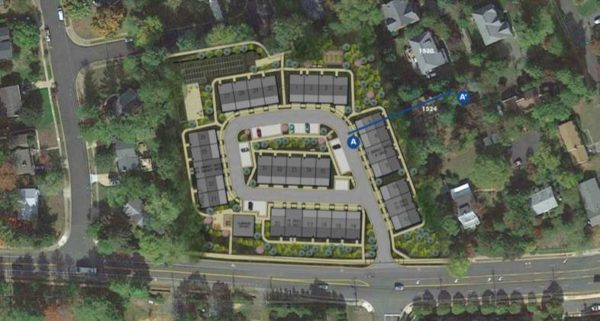
After a two-week delay, the Fairfax County Planning Commission voted on March 17 to support a proposed senior living facility in McLean.
Tri-State Development Companies secured a recommendation from Fairfax County planners in February to build on the 3.23-acre site at 1638 and 1642 Chain Bridge Road. The project would replace the existing single-family dwellings with 35 independent living units, five of which are expected to be sold as affordable.
The commission previously deferred making a decision on the project after a public hearing on March 3. Speakers voiced concerns about the heights of the units, potential traffic congestion, stormwater runoff, and the impact of a proposed clubhouse and patio on an immediate neighbor of the site.
Dranesville District Commissioner John Ulfelder recommended that the Fairfax County Board of Supervisors grant Tri-State’s special exception request after addressing several of the issues raised at the public hearing.
Ulfelder said the building heights would range between 36 and 40 feet, exceeding the 35 feet permitted in a R-3 zone, to allow for certain roof structures of the units to fit the surrounding neighborhoods.
“In addition, due to the typography of the site, the homes are set at a lower grade level than the surrounding homes,” Ulfelder said. “As a result, the roof heights are actually roughly comparable to the neighboring properties.”
In response to suggestions that a traffic signal be installed at the intersection of Chain Bridge and Davidson Road, Ulfelder noted that a traffic analysis predicts the facility would generate only 85 vehicle trips per day — fewer than what would be generated by a by-right development. The analysis also projected fewer than 10 trips in either the morning or evening peak hour.
He added that Virginia Department of Transportation traffic analysis done as part of the ongoing McLean Community Business Center Comprehensive Plan study concluded that a signal at the Chain Bridge/Davidson intersection might not be warranted for 20 years.
Ulfelder said the applicant has nonetheless “agreed to reserve space near its entrance for the installation of a future traffic signal if it is warranted.”
He said that the stormwater runoff concerns were addressed by Tri-State’s commitment to install a new stormwater system on the site that would exceed what is required by the county and state.
“This will result in the detention of storm water on site and should result in an improvement for the downstream neighbors with less storm water being released from the site during rain events,” Ulfelder said.
Ulfelder also addressed the construction of the proposed clubhouse and patio, which was a concern for Bobbi Bowman, who lives in a property that abuts the site.
According to Ulfelder, Tri-State has flipped the clubhouse’s layout, moving the patio to the west side of the building, where it will be blocked from Bowman’s property. He also said hours of use for the patio would be restricted, with no music allowed outdoors and no happy hour or cocktail parties.
“I believe these changes adequately address the neighbor’s concerns about the possible impact of the patio on her peaceful and quiet enjoyment of her property,” Ulfelder said.
Mary Cortina, who represents Braddock District, was the only commissioner to oppose permitting the project.
While she expressed an appreciation for its design, stormwater retention plan, and amenities, Cortina argued that the site is not large enough for the number of proposed units and would create too much density without “adequate buffering to the surrounding neighborhood.” She also worried that the high density would result in insufficient tree preservation.
“It’s not neighborly to remove all the trees and max out the site, even if it is beautifully designed and serves a priority segment,” Cortina said. “Fairfax County has a wave of senior developments to accommodate, but if we want them to incorporate into existing neighborhoods, they need to meet the setbacks and the other standards in the zoning ordinance to fit into the neighborhood.”
Tri-State’s proposal will go before the Board of Supervisors for a public hearing on May 4 at 3:30 p.m.
Map via Fairfax County
Some big changes are coming to McLean, and Dranesville Supervisor John Foust says he supports many — but not all — of them.
During a “Good Morning, McLean” breakfast hosted by the Greater McLean Chamber of Commerce yesterday morning (Thursday), Foust highlighted ongoing redevelopment work to the downtown area and Chain Bridge Road, but expressed caution about proposed zoning changes.
He repeated his support for the McLean Commercial Business Center revitalization plan despite some vocal opposition, saying it encourages development while protecting those who do not want McLean to become the next Tysons. The Fairfax County Planning Commission will hold a public hearing on the plan on April 28, and it will go before the Board of Supervisors on May 18.
Foust also spoke favorably about Tri-State Development’s proposal to build a 35-unit senior living facility with townhouses on a Chain Bridge Road site that would otherwise fit nine single-family homes. Earlier this month, the planning commission deferred a decision on the plan until next Wednesday (March 17).
“It’s exactly what McLean residents are looking for who want to downsize but don’t want to leave McLean,” Foust said. “Fundamentally, it’s a good application, and I think it’ll probably get approved.”
The project has received some pushback from nearby residents who say the project extends the business district into their residential area and will cause transportation and parking problems.
Foust acknowledged these complaints, adding that a dedicated left turn lane at the Chain Bridge and Davidson Road intersection could be needed to account for car and foot traffic. Ultimately, though, he believes it is better than the alternative for developers.
“Building nine houses would’ve been miserable,” he said.
McLean is also bracing for the potential impact of Fairfax County’s Zoning Ordinance Modernization project. Most of the changes proposed by county staff are “non-controversial” and will simplify frustrating ordinances, Foust said.
But he opposes a few elements that have also consternated the public, including proposed regulations on flags and changes to the permits required to operate a business from home.
Foust says loosening customer and signage rules for home-based businesses could lead to more businesses in residential areas.
“Staff prepared, I think, a very liberalized version,” he said. “I’m not excited about the direction staff is trying to take this.”
Outside of development and zoning issues, Foust says that, as chair of the Board of Supervisors’ economic initiatives committee, he has been focused on how Fairfax County will recover from the COVID-19 pandemic once it’s over.
The committee will receive a presentation on Tuesday from a consultant that the county hired last year to develop recommendations for its road to recovery. Right now, about $15 million are earmarked for implementing recovery programs, but Foust predicts “that number will increase dramatically” when Fairfax County receives federal funding through the American Rescue Plan Act.
According to Fairfax County, that sum could be $222.56 million, although the exact amount has not yet been confirmed by the federal government.
In the meantime, the vaccine process is picking up, even with more than 103,000 people currently on Fairfax County’s waitlist.
“We’re getting through it,” Foust said. “…I get so frustrated sometimes with the failures we’ve encountered, the bumps in the road, but when I step back and look at what staff and others are accomplishing, it’s just amazing.”
Staff photo by Jay Westcott

The fate of a potential senior living facility in McLean has been put on hold.
The Fairfax County Planning Commission deferred a decision to permit an independent living facility for adults 60 and older on Chain Bridge Road on March 3. The decision on the project is now scheduled for March 17 during the commission’s meeting, which will start at 7:30 p.m.
Dranesville District Commissioner John Ulfedler proposed deferring the decision in order to address issues presented during the March 3 public hearing.
Tri-State Development Companies secured a recommendation from Fairfax County’s planning staff in February for the development of the 3.23-acre site. The company has proposed replacing existing single-family dwellings at 1638 and 1642 Chain Bridge Road with 35 independent living units.
When presenting the staff report, Fairfax County senior planner Kelly Posusney noted that 15% of the dwellings will be provided as affordable, 55% of the site will be open space, and 90 total parking spaces would be provided via private garages attached to the individual dwellings and surface parking in the development.
McGuireWoods managing partner Greg Riegle, who represents Tri-State on the project, said the development would feature on-site management to assist residents with day-to-day living and amenities like fitness programs and entertainment.
“A commitment to provide the services, amenities and access to care appropriate to an aging population drives almost everything about this application,” Riegle said.
While there was some support from the public during the March 3 public hearing, many also raised questions and concerns about the potential for the project to increase traffic in the community, the development’s height, proposed setbacks, noise and light pollution, and storm water management.
Riegle said the project team is working on storm water management concerns by making downstream improvements. The plans also include on-site storm water management facilities to control an increase in runoff, addressing inadequate pipe capacity and flooding of properties downstream.
He added the proposed height of the residential units would not exceed 50 feet. The project overview lists the height of the units as between 36 and 40 feet, “depending on the style of roof.”
Multiple community members called for further evaluation of the development’s possible impact on traffic. Resident Elizabeth Yu requested that a traffic signal be installed at the intersection of Chain Bridge Road and Davidson Road, which runs perpendicular to the project site.
However, Riegle said an analysis performed by the project applicant and VDOT guidelines showed the project does not warrant installation of a signal.
Tri-State’s request to reduce the required 50-foot yard setback to between 27 and 34 feet, depending on the side of the lot, was a particular point of concern for Bobbi Bowman, the abutting neighbor to the site. She specifically requested that a proposed clubhouse, outdoor dining area, and fire pit be relocated from an area adjacent to her property to another location on the site.
“This clubhouse restaurant is essentially a business located adjacent to my home and my very low-density and quiet neighborhood,” Bowman said. “The clubhouse with its noise, and lights and happy hours is even closer to my home and our neighborhood because the applicant has asked to shrink the setbacks.”
Riegle said the clubhouse will be 83 feet from the common property line and the outdoor dining area 88 feet from the neighboring building, but he added that the issue is still being addressed.
“I think we can do some things with landscaping or the special arrangement to potentially improve that,” Riegle said. “We’ve conveyed that to the resident and we will continue to work on that between now and when this application is brought back for decision.”
Map via Fairfax County
The Fairfax County Planning Commission voted unanimously on Wednesday (Mar. 3) to recommend that the county replace its current zoning code with a new draft resulting from the Zoning Ordinance Modernization Project (zMOD) that has now been underway for almost four years.
The 12-0 vote came after more than an hour of debate over the county’s proposed regulations for accessory living units (ALUs) — independent residential units located on the same property as a primary dwelling — and home-based businesses, which have emerged as two of the most contentious components of the 614-page document.
“The zMOD result on ALUs and home-based businesses, I believe, misses the mark,” Mason District Commissioner Julie Strandlie said. “It does not incorporate community concern and avoids a significant opportunity to make a real difference in housing policy. If we want to successfully expand housing options, we need community input, involvement, and buy-in.”
Released on Feb. 17, the draft zoning ordinance crafted by county planning staff and the consultant Clarion proposed allowing ALUs for single-family detached dwellings with an administrative permit if they meet certain requirements, including a maximum gross floor area of 800 square feet or 40% of the principal dwelling and that an occupant be at least 55 years old or have a disability.
Citing an “exceptional amount” of public opposition to that proposal, including at a public hearing on Jan. 28, the planning commission recommended that the Fairfax County Board of Supervisors instead utilize a special permit review process for all ALUs, which requires property owners to notify neighbors and make their case at a public hearing.
“This [administrative] process — what I’m seeing and what I’ve personally experienced — it pits neighbor against neighbor, or potentially could put neighbor against neighbor,” Mount Vernon District Commissioner Walter Clarke said. “I think it’s only fair, and we owe it to the citizens of this community, to have a process whereby they still can be engaged.”
The commission also recommended lifting the requirement that an occupant have a disability or be 55 years or older when an ALU is approved with a special permit, and allowing units to fill a basement or cellar based on its existing size on the date the new zoning ordinance becomes effective.
The commission also recommended amending the draft to prohibit on-site customers for home-based businesses approved through an administrative permit, except in cases involving instructional activities at a “specialized instruction center” — i.e., private tutoring or music lessons — or a health and exercise facility.
Instruction centers and health and exercise facilities could have up to four students at a time and eight students in a day. Other home-based businesses could have customers if they obtain a special permit.
In addition, all home-based businesses will have to be approved by the Fairfax County Health Department if there is a well or septic tank on site, a provision that was already proposed for ALUs.
While acknowledging that ALUs could help people who otherwise might not be able to afford to live in Fairfax County, the majority of commissioners ultimately expressed reservations about loosening restrictions across the entire county without getting a clearer sense of the potential impact on traffic, parking, and other issues, especially in high-density areas.
“While I do believe that accessory living units can provide an opportunity for additional living space in our very expensive county, I believe additional time is needed for study of the proposed countywide applications of accessory living units by administrative review,” At-Large Commissioner Timothy Sargeant said.
The commission recommended that the Board of Supervisors direct the county planning department to convene a task force that will study ALUs and home-based businesses for 18 months and deliver a report with any recommendations for further changes to the zoning ordinance.
Earlier in the meeting, the commission shot down a proposed zoning amendment that would have altered regulations for flags and flag poles, calling it “a solution in search of a problem.” The county’s only existing regulation for flags is a limit of three per lot.
Fairfax County launched its zMOD initiative in March 2017 with the goal of simplifying and updating a document that had not undergone a comprehensive revision since it was first adopted 40 years ago.
The Board of Supervisors is scheduled to hold a public hearing on the new zoning ordinance on Tuesday (Mar. 9). If the ordinance is adopted as it was approved by the planning commission, it would take effect at 12:01 a.m. on July 1.
Image via Town of Vienna
Fairfax County Planning Commission Defers Vote on zMOD — The commission was scheduled to vote on the county’s proposed modernized zoning ordinance when it met on Wednesday (Feb. 24). Commissioners decided to defer the decision to Mar. 3 “to take some additional time for consideration.” [Fairfax County Planning Commission]
Wawa Customers Could Get Payout From 2019 Data Breach — “Between March 4, 2019 and Dec. 12, 2019, Wawa’s stores and fuel pumps were targeted by a data breach at all of its 850 stores in Pennsylvania, New Jersey, Delaware, Maryland, Virginia, Florida and Washington, D.C…Now, a proposed settlement could lead to a payout for affected customers by way of Wawa gift cards and even cash.” [Patch]
Northam and Hogan Praise Progress on American Legion Bridge Project — The Virginia and Maryland governors issued a joint statement yesterday saying that the effort to replace the aging, oft-congested American Legion Bridge is “truly a generational project, and we are excited to move forward.” Fairfax County leaders and residents have been advocating for the timeline of the 495 NEXT project in McLean to be more closely aligned with Maryland’s express lanes project. [Virginia Governor’s Office]
General Assembly Passes Bill Requiring Full-Time, In-Person Learning — The State Senate voted 36-3 yesterday to send a bill that would require school districts to give students an option to attend in-person classes full-time, with some limited exceptions, including if a school has high levels of COVID-19 transmission. The legislation is now on Gov. Ralph Northam’s desk and would go into effect on July 1 if signed into law. [ABC7-WJLA]
Park Authority Warns Against Online Scam — “The Fairfax County Park Authority (FCPA) has been notified of a Facebook page that uses the FCPA logo and a misspelled version of Fairfax County to friend request and message people that they have won a prize. The recipient is asked to click on the link to claim the prize. THIS IS A SCAM.” [Fairfax County Park Authority]
Final preparations are underway in the City of Falls Church for a pilot program to replace the city’s street lights with more energy-efficient LED bulbs.
The Falls Church Planning Commission is scheduled to provide feedback on proposed designs for the new street lights during its meeting tonight (Wednesday).
The pilot will proceed the rollout of a city-wide LED street light replacement program “to ensure that any unintended consequences will be mitigated,” according to a staff report that will be presented to the planning commission.
Falls Church initiated plans to convert over 1,000 street lights to LED last summer when the city added a “Streetlights and Sidewalks” program to its Fiscal Year 2021-2026 Capital Improvements Program (CIP). The program stems from a regional partnership with Dominion Energy, which has also committed to converting the street lights that it owns in Fairfax County to LED.
According to Falls Church staff, LED lights last five times longer and consume 75% less energy than the mercury vapor and high pressure sodium fixtures that are currently being used.
An energy savings summary prepared by a consultant indicates that converting street lights to LED will cost $152,639 — an average of $150 per light — but it will save the city $3,793 in monthly energy costs. The city would also reduce its energy usage by 40,270 kilowatts per month and its annual carbon emissions by 393,262 pounds.
“Energy and maintenance cost savings allow for payback periods of as little as four years for a basic fixture, or 12 years for a premium fixture,” Falls Church City Public Works Director Zak Bradley said in a memo. “The lighting can also offer improved visibility for public safety, enhancing walkability and bikeability in the City.”
The pilot program will focus on a small portion of the city designated by staff. Affected residents will receive letters notifying them that they can report any negative impacts resulting from the new LED lights immediately, though the city is not accepting public input on the aesthetics and design of the lights.
The pilot could start as soon as this month and will last one month before Falls Church starts expanding the LED street light conversion to the whole city.
Photo via Google Maps
Virginia Issues New Guidance to Support Schools Reopening — “A school division’s capacity to successfully implement mitigation strategies AND local community disease data should be factored into school operations plans…As local school and health leaders evaluate and adjust instructional offerings in 2021, they must carefully balance the risks associated with operating during a pandemic and the long-term effects of students not attending school in person.” [Virginia Department of Education]
Vienna Planning Commission Kicks Off Comprehensive Plan Review — Virginia law requires localities to review their comprehensive plan every five years. Planning commissioners don’t expect this new review to be as extensive as the Town of Vienna’s last update in 2016, but some sections, such as the chapter dealing with economic development, could be in need of revision. [Town of Vienna]
Fairfax County Sheriff’s Office Starts COVID-19 Vaccinations — “Today was the day! We are so very grateful to get the COVID-19 vaccine. @VDHgov @fairfaxhealth #FairfaxStrong” [Fairfax County Sheriff’s Office/Twitter]
Staff Photo by Jay Westcott



